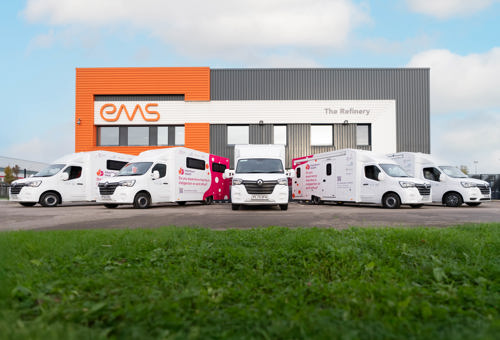EMS Healthcare provides Mobile Screening Vans and Research Nurses for landmark BEST4 Screening Trial
 Dr Clare Grace
Dr Clare Grace
Published 28 November 2024
 Clinical research
Clinical research
We’re proud to be supporting the BEST4 Screening trial, providing the community research sites and research nurses to support bringing the capsule sponge test into communities.
The BEST4 Screening trial, which is now underway, will find out if the capsule sponge test could be used to screen people with heartburn for Barrett’s oesophagus – a condition that can lead to oesophageal cancer.
The trial is backed by £6.4 million of funding from Cancer Research UK and the National Institute for Health and Care Research (NIHR). It will be led by Cambridge University Hospitals NHS Foundation Trust (CUH) and the University of Cambridge, with the Cancer Research UK Cancer Prevention Trials Unit at Queen Mary University of London designing the trial and analysing results from it.
The capsule sponge test takes ten minutes to do and can be done by a nurse – making it much faster and less expensive than endoscopy. The trial will find out if the capsule sponge test can reduce the need for cancer treatments and prevent deaths from oesophageal cancer. The trial showcases UK science and innovation and is the last step in a series of clinical trials to see if the capsule sponge test could be offered in the cancer screening programmes of the 4 UK nations.
EMS Healthcare are providing research nurses and mobile screening vans, which will be rolled out across England to deliver the tests as part of the trial. Over the next three years, these community research sites will help facilitate the recruitment of 120,000 participants who experience chronic heartburn - a key symptom of Barrett’s oesophagus, a precursor to oesophageal cancer.

Paul Anderson (59), a stock controller from St Neots, is one of the first participants to join the BEST4 Screening trial in Cambridgeshire, said: “I’d never been on a clinical trial before, but when the invitation came for this one, I felt I had to sign up as the acid reflux had flared back up again. I’m hoping that it may give me some more insight into my chronic heartburn, as well as helping people who may have similar concerns about their health.
Director of the Early Cancer Institute at the University of Cambridge, inventor of the capsule sponge test and co-principal investigator of the BEST4 trials, Professor Rebecca Fitzgerald, said:
“The capsule sponge is changing how we detect Barrett’s oesophagus and oesophageal cancer. Catching it earlier can save lives and reduce the need for chemotherapy and surgery to remove the oesophagus. Thousands of people have already benefited in trials and pilot programmes, and now we’re taking the test to the next level to see if we could offer this to everyone with heartburn.”
Director of the Cancer Research UK Cancer Prevention Trials Unit at Queen Mary University of London and co-principal investigator of the BEST4 trials, Professor Peter Sasieni, said:
“Most people with Barrett’s oesophagus have heartburn, but most people with heartburn don’t have Barrett’s oesophagus. We have already shown that the capsule sponge can reliably identify people with Barrett’s oesophagus. Now we need to show that using it in a targeted screening programme can help prevent oesophageal cancer and reduce deaths from this disease.
“The BEST4 Screening trial will involve over a hundred thousand people joining across the UK. It is a huge undertaking which will take many years, but it is important that we find out whether a new routine screening programme really will prevent cancers and save lives.”
Chief Executive of Cancer Research UK, Michelle Mitchell, said:
“Around 59% of all oesophageal cancer cases are preventable. Yet endoscopy, the gold standard for diagnosing and treating this cancer, is labour-intensive and not practical for a population screening programme.
“Backed by funding from Cancer Research UK, the capsule sponge has become one of the most exciting early detection tools to emerge in recent years. It’s a remarkable invention by Professor Fitzgerald and her team, and previous trials have shown how powerful it can be in identifying cancer earlier.
“Cancer Research UK is proud to be supporting this landmark clinical trial, bringing the capsule sponge test into the community and offering it to a much wider group of patients. After many decades of research, we’re on the cusp of transforming oesophageal cancer diagnosis forever.”
More information about how to join the trial can be found at https://best4trial.secureserversites.net/ or by contacting cuh.best4.trial@nhs.net. You can also sign up to the NIHR’s Be Part of Research service at bepartofresearch.uk to take part in clinical research.